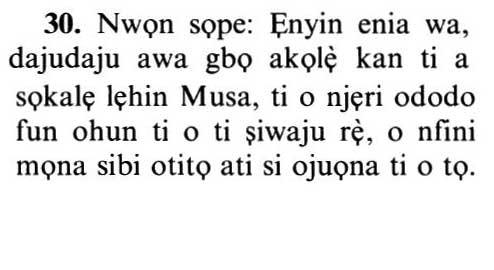46vs30
Select any filter and click on Go! to see results
قَالُوا يَا قَوْمَنَا إِنَّا سَمِعْنَا كِتَاباً أُنزِلَ مِن بَعْدِ مُوسَى مُصَدِّقاً لِّمَا بَيْنَ يَدَيْهِ يَهْدِي إِلَى الْحَقِّ وَإِلَى طَرِيقٍ مُّسْتَقِيمٍ
Qaloo ya qawmana inna samiAAna kitaban onzila min baAAdi moosa musaddiqan lima bayna yadayhi yahdee ila alhaqqi waila tareeqin mustaqeemin
Index Terms
Click to play
Yoruba Translation

Hausa Translation
Suka ce: "Ya mutãnenmu! Lalle mũ, mun ji wani littãfi an saukar da shi a bãyãn Mũsã,mai gaskatãwa ga abin da ke a gaba da shi, yanã shiryarwa ga gaskiya da kuma zuwa ga hanya madaidaiciya.
Asbabu n-Nuzuul (Occasions of Revelation)
Allah then explains how the Jinns warned their people. He says,
قَالُوا يَا قَوْمَنَا إِنَّا سَمِعْنَا كِتَابًا أُنزِلَ مِن بَعْدِ مُوسَى ...
They said: "O our people! Verily, we have heard a Book sent down after Musa...''
They did not mention `Isa, peace be upon him, because the Injil that was revealed to him contained admonitions and exhortations, but very few permissions or prohibitions. Thus, it was in reality like a complement to the legislation of the Tawrah, the Tawrah being the reference. That is why they said, "Sent down after Musa.''
This is also the way that Waraqah bin Nawfal spoke when the Prophet told him about his first meeting with Jibril, An-Namus, peace be upon him. He said: "Very good, very good! This is (the angel) that used to come to Musa. I wish that I was still a young man (to support you).''
... مُصَدِّقًا لِّمَا بَيْنَ يَدَيْهِ ...
confirming what came before it,
meaning, the Scriptures that were revealed before it to the previous Prophets.
They then said,
... يَهْدِي إِلَى الْحَقِّ ...
it guides to the truth, (means in belief and information).
... وَإِلَى طَرِيقٍ مُّسْتَقِيمٍ ﴿٣٠﴾
and to the straight path. (which means, in deeds).
For verily, the Qur'an contains two things:
- information and
- commandments.
Its information is true, and its commandments are all just, as Allah says,
وَتَمَّتْ كَلِمَةُ رَبِّكَ صِدْقاً وَعَدْلاً
And the Word of Your Lord has been fulfilled in truth and in justice. (6:115)
Allah says,
هُوَ الَّذِي أَرْسَلَ رَسُولَهُ بِالْهُدَى وَدِينِ الْحَقِّ
It is He Who has sent His Messenger with the guidance and the religion of truth. (9:122)
The guidance is the beneficent knowledge, and the religion of truth means the righteous good deeds.
Thus, the Jinns said, يَهْدِي إِلَى الْحَقِّ (it guides to the truth) in matters of belief, وَإِلَى طَرِيقٍ مُّسْتَقِيمٍ (and to the straight path.) meaning, in regard to actions.
ثم إنه تعالى فسر إنذار الجن لقومهم فقال مخبرا عنهم " قالوا يا قومنا إنا سمعنا كتابا أنزل من بعد موسى " ولم يذكروا عيسى لأن عيسى عليه السلام أنزل عليه الإنجيل فيه مواعظ وترقيقات وقليل من التحليل والتحريم وهو في الحقيقة كالمتمم لشريعة التوراة فالعمدة هو التوراة فلهذا قالوا أنزل من بعد موسى وهكذا قال ورقة بن نوفل حين أخبره النبي صلى الله عليه وسلم بقصة نزول جبريل عليه عليه الصلاة والسلام أول مرة فقال بخ بخ هذا الناموس الذي كان يأتي موسى يا ليتني أكون فيها جذعا " مصدقا لما بين يديه " أي من الكتب المنزلة على الأنبياء قبله وقولهم " يهدي إلى الحق " أي في الاعتقاد والإخبار " وإلى طريق مستقيم " في الأعمال فإن القرآن مشتمل على شيئين خبر وطلب فخبره صدق وطلبه عدل كما قال تعالى " وتمت كلمة ربك صدقا وعدلا " وقال سبحانه وتعالى " هو الذي أرسل رسوله بالهدى ودين الحق " فالهدى هو العلم النافع ودين الحق هو العمل الصالح ولهذا قالت الجن " يهدي إلى الحق " في الاعتقادات " وإلى طريق مستقيم " أي في العمليات .
"قالوا يا قومنا إنا سمعنا كتابا" هو القرآن "أنزل من بعد موسى مصدقا لما بين يديه" أي تقدمه كالتوراة "يهدي إلى الحق" الإسلام "وإلى طريق مستقيم" أي طريقه
أي القرآن , وكانوا مؤمنين بموسى . قال عطاء : كانوا يهودا فأسلموا , ولذلك قالوا : " أنزل من بعد موسى " . وعن ابن عباس : أن الجن لم تكن سمعت بأمر عيسى , فلذلك قالت : " أنزل من بعد موسى " .
I'raab - grammatical analysis of the Qur'an
«قالُوا» ماض وفاعله والجملة مستأنفة.
«يا قَوْمَنا» منادى مضاف منصوب.
«إِنَّا» إن واسمها.
«سَمِعْنا» ماض وفاعله.
«كِتاباً» مفعول به والجملة خبر إنا.
«أُنْزِلَ» ماض مبني للمجهول ونائب الفاعل مستتر والجملة صفة كتابا.
«مِنْ بَعْدِ» متعلقان بالفعل.
«مُوسى » مضاف إليه.
«مُصَدِّقاً» صفة كتابا.
«لِما» متعلقان بمصدقا.
«بَيْنَ» ظرف مكان.
«يَدَيْهِ» مضاف إليه.
«يَهْدِي» مضارع فاعله مستتر والجملة صفة كتابا.
«إِلَى الْحَقِّ» متعلقان بالفعل.
«وَإِلى طَرِيقٍ» معطوفان على ما قبلهما.
«مُسْتَقِيمٍ» صفة طريق.
